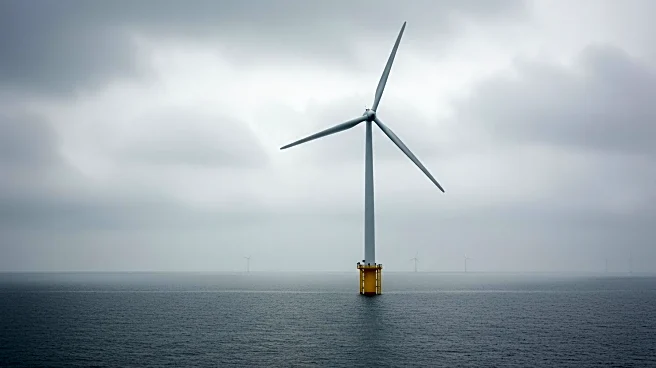What's Happening?
The Trump administration has halted construction on the Revolution Wind project, an offshore wind farm near Rhode Island that was nearing completion. The project, developed by Danish company Orsted, was about 80% complete with 45 out of 65 turbines installed. The Bureau of Ocean Energy Management issued the stop-work order, citing unspecified national security concerns. This decision aligns with President Trump's broader agenda to prioritize fossil fuels over renewable energy sources, despite the project's clearance of federal and state reviews. The halt has drawn criticism from local leaders, including Rhode Island Governor Dan McKee and Connecticut Governor Ned Lamont, who are seeking ways to reverse the decision.
Why It's Important?
The halt of the Revolution Wind project represents a significant setback for renewable energy efforts in the U.S., particularly in densely populated states like Rhode Island and Connecticut that rely on offshore wind to meet climate goals. The project was expected to power over 350,000 homes, contributing to the states' renewable energy targets. The decision underscores the Trump administration's opposition to wind and solar power, which scientists argue are crucial for combating climate change. The move may impact the U.S.'s ability to transition to cleaner energy sources, affecting both environmental goals and the renewable energy industry.
What's Next?
The halt has prompted Orsted to evaluate the financial implications and consider legal action. Local leaders, including Connecticut Senator Richard Blumenthal, have vowed to fight the decision, emphasizing the project's importance for employment and energy goals. The situation may lead to further political and legal battles as stakeholders seek to resume construction. The broader implications for the offshore wind industry and U.S. energy policy remain uncertain, with potential impacts on future projects and investments in renewable energy.
Beyond the Headlines
The decision to halt the Revolution Wind project highlights the ongoing tension between fossil fuel interests and renewable energy advocates. It raises questions about the role of national security in energy policy and the potential influence of political agendas on environmental decisions. The move may also affect public perception of renewable energy and its viability as a solution to climate change, potentially influencing future policy and investment decisions.










